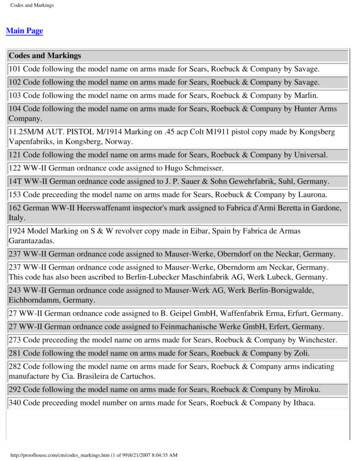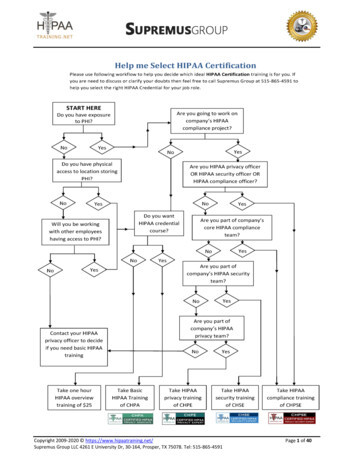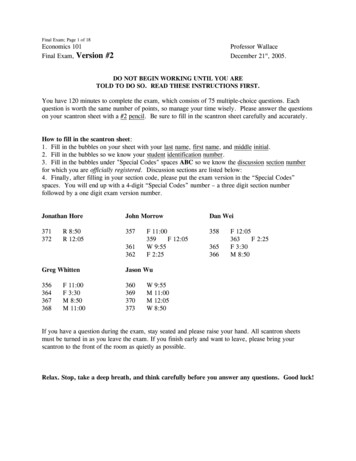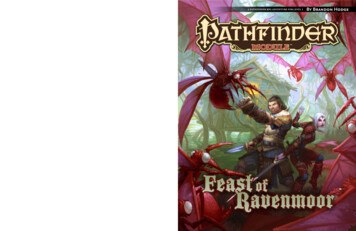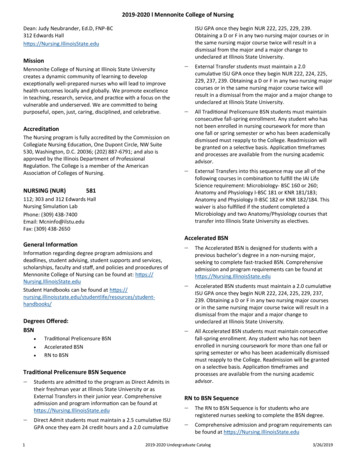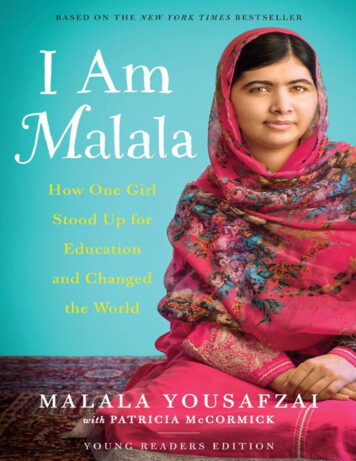
Transcription
Begin ReadingTable of ContentsPhotosCopyright PageIn accordance with the U.S. Copyright Act of 1976, the scanning, uploading, and electronic sharing of any part of this book without thepermission of the publisher is unlawful piracy and theft of the author’s intellectual property. If you would like to use material from thebook (other than for review purposes), prior written permission must be obtained by contacting the publisher atpermissions@hbgusa.com. Thank you for your support of the author’s rights.
To those children all over the world who have no accessto education, to those teachers who bravely continueteaching, and to anyone who has fought for their basichuman rights and education.
PROLOGUEWhen I close my eyes, I can see my bedroom. The bed is unmade, my fluffy blanket in a heap, becauseI’ve rushed out for school, late for an exam. My school schedule is open on my desk to a page dated 9October 2012. And my school uniform—my white shalwar and blue kamiz—is on a peg on the wall,waiting for me.I can hear the neighborhood kids playing cricket in the alley behind our home. I can hear the humof the bazaar not far away. And if I listen very closely, I can hear Safina, my friend next door, tappingon the wall we share so she can tell me a secret.I smell rice cooking as my mother works in the kitchen. I hear my little brothers fighting over theremote—the TV switching between WWE SmackDown and cartoons. Soon I’ll hear my father’s deepvoice as he calls out my nickname. “Jani,” he’ll say, which is Persian for “dear one.” “How was theschool running today?” He was asking how things were at the Khushal School for Girls, which hefounded and I attended, but I always took the opportunity to answer the question literally.“Aba,” I’d joke. “The school is walking, not running!” This was my way of telling him I thoughtthings could be better.I left that beloved home in Pakistan one morning—planning to dive back under the covers as soonas school let out—and ended up a world away.Some people say it is too dangerous for me to go back there now. That I’ll never be able to return.And so, from time to time, I go there in my mind.But now another family lives in that home, another girl sleeps in that bedroom—while I amthousands of miles away. I don’t care much about the other things in my room, but I do worry aboutthe school trophies on my bookcase. I even dream about them sometimes. There’s a runners-up awardfrom the first speaking contest I ever entered. And more than forty-five golden cups and medals forbeing first in my class in exams, debates, and competitions. To someone else, they might seem meretrinkets made of plastic. To someone else, they may simply look like prizes for good grades. But tome, they are reminders of the life I loved and the girl I was—before I left home that fateful day.When I open my eyes, I am in my new bedroom. It is in a sturdy brick house in a damp and chillyplace called Birmingham, England. Here there is water running from every tap, hot or cold as youlike. No need to carry cans of gas from the market to heat the water. Here there are large rooms withshiny wood floors, filled with large furniture and a large, large TV.There is hardly a sound in this calm, leafy suburb. No children laughing and yelling. No womendownstairs chopping vegetables and gossiping with my mother. No men smoking cigarettes anddebating politics. Sometimes, though, even with these thick walls between us, I can hear someone inmy family crying for home. But then my father will burst through the front door, his voice booming.“Jani!” he’ll say. “How was school today?”Now there’s no play on words. He’s not asking about the school he runs and I attend. But there’s anote of worry in his voice, as if he fears I won’t be there to reply. Because it was not so long ago thatI was nearly killed—simply because I was speaking out about my right to go to school.
It was the most ordinary of days. I was fifteen, in grade nine, and I’d stayed up far too late the nightbefore, studying for an exam.I’d already heard the rooster crow at dawn but had fallen back to sleep. I’d heard the morning callto prayer from the mosque nearby but managed to hide under my quilt. And I’d pretended not to hearmy father come to wake me.Then my mother came and gently shook my shoulder. “Wake up, pisho,” she said, calling me kittenin Pashto, the language of the Pashtun people. “It’s seven thirty and you’re late for school!”I had an exam on Pakistani studies. So I said a quick prayer to God. If it is your will, may I pleasecome in first? I whispered. Oh, and thank you for all my success so far!I gulped down a bit of fried egg and chapati with my tea. My youngest brother, Atal, was in anespecially cheeky mood that morning. He was complaining about all the attention I’d received forspeaking out about girls getting the same education as boys, and my father teased him a little at thebreakfast table.“When Malala is prime minister someday, you can be her secretary,” he said.Atal, the little clown in the family, pretended to be cross. “No!” he cried. “She will be mysecretary!”All this banter nearly made me late, and I raced out the door, my half-eaten breakfast still on thetable. I ran down the lane just in time to see the school bus crammed with other girls on their way toschool. I jumped in that Tuesday morning and never looked back at my home.The ride to school was quick, just five minutes up the road and along the river. I arrived on time, andexam day passed as it always did. The chaos of Mingora city surrounded us with its honking hornsand factory noises while we worked silently, bent over our papers in hushed concentration. By day’send I was tired but happy; I knew I’d done well on my test.“Let’s stay on for the second trip,” said Moniba, my best friend. “That way we can chat a littlelonger.” We always liked to stay on for the late pickup.For days I’d had a strange, gnawing feeling that something bad was going to happen. One night I’dfound myself wondering about death. What is being dead really like? I wanted to know. I was alonein my room, so I turned toward Mecca and asked God. “What happens when you die?” I said. “Howwould it feel?”If I died, I wanted to be able to tell people what it felt like. “Malala, you silly girl,” I said tomyself then, “you’d be dead and you couldn’t tell people what it was like.”Before I went to bed, I asked God for one more thing. Can I die a little bit and come back, so Ican tell people about it?But the next day had dawned bright and sunny, and so had the next one and the one after that. Andnow I knew I’d done well on my exam. Whatever cloud had been hanging over my head had begun toclear away. So Moniba and I did what we always did: We had a good gossip. What face cream wasshe using? Had one of the male teachers gone for a baldness cure? And, now that the first exam wasover, how difficult would the next one be?When our bus was called, we ran down the steps. As usual, Moniba and the other girls coveredtheir heads and faces before we stepped outside the gate and got into the waiting dyna, the white truckthat was our Khushal School “bus.” And, as usual, our driver was ready with a magic trick to amuse
us. That day, he made a pebble disappear. No matter how hard we tried, we couldn’t figure out hissecret.We piled inside, twenty girls and two teachers crammed into the three rows of benches stretchingdown the length of the dyna. It was hot and sticky, and there were no windows, just a yellowedplastic sheet that flapped against the side as we bounced along Mingora’s crowded rush-hour streets.Haji Baba Road was a jumble of brightly colored rickshaws, women in flowing robes, men onscooters, honking and zigzagging through the traffic. We passed a shopkeeper butchering chickens. Aboy selling ice-cream cones. A billboard for Dr. Humayun’s Hair Transplant Institute. Moniba and Iwere deep in conversation. I had many friends, but she was the friend of my heart, the one with whomI shared everything. That day, when we were talking about who would get the highest marks this term,one of the other girls started a song, and the rest of us joined in.Just after we passed the Little Giants snack factory and the bend in the road not more than threeminutes from my house, the van slowed to a halt. It was oddly quiet outside.“It’s so calm today,” I said to Moniba. “Where are all the people?”I don’t remember anything after that, but here’s the story that’s been told to me:Two young men in white robes stepped in front of our truck.“Is this the Khushal School bus?” one of them asked.The driver laughed. The name of the school was painted in black letters on the side.The other young man jumped onto the tailboard and leaned into the back, where we were allsitting.“Who is Malala?” he asked.No one said a word, but a few girls looked in my direction. He raised his arm and pointed at me.Some of the girls screamed, and I squeezed Moniba’s hand.Who is Malala? I am Malala, and this is my story.
PART ONE
Before the Taliban
1
As Free as a BirdI am Malala, a girl like any other—although I do have my special talents.I am double-jointed, and I can crack the knuckles on my fingers and my toes at will. (And I enjoywatching people squirm as I do it.) I can beat someone twice my age at arm wrestling. I like cupcakesbut not candy. And I don’t think dark chocolate should be called chocolate at all. I hate eggplant andgreen peppers, but I love pizza. I think Bella from Twilight is too fickle, and I don’t understand whyshe would choose that boring Edward. As my girlfriends in Pakistan and I say, he doesn’t give her anylift.Now, I don’t care much for makeup and jewelry, and I’m not a girly girl. But my favorite color ispink, and I do admit I used to spend a lot of time in front of the mirror playing with my hair. And whenI was younger, I tried to lighten my skin with honey, rose water, and buffalo milk. (When you put milkon your face, it smells very bad.)I say that if you check a boy’s backpack, it will always be a mess, and if you check his uniform, itwill be dirty. This is not my opinion. This is just a fact.I am a Pashtun, a member of a proud tribe of people spread across Afghanistan and Pakistan. Myfather, Ziauddin, and my mother, Toor Pekai, are from mountain villages, but after they married, theyrelocated to Mingora, the largest city in the Swat Valley, which is in northwest Pakistan, where I wasborn. Swat was known for its beauty, and tourists came from all over to see its tall mountains, lushgreen hills, and crystal-clear rivers.I’m named for the great young Pashtun heroine Malalai, who inspired her countrymen with hercourage.But I don’t believe in fighting—even though my fourteen-year-old brother, Khushal, annoys me tono end. I don’t fight with him. Rather, he fights with me. And I agree with Newton: For every action,there is an equal and opposite reaction. So I guess you could say that when Khushal fights with me, Ioblige him. We argue over the TV remote. Over chores. Over who’s the better student. Over who atethe last of the Cheesy Wotsits. Over whatever you can think of.My ten-year-old brother, Atal, annoys me less. And he is quite good at chasing down the cricketball when we kick it out of bounds. But he does make up his own rules sometimes.When I was younger and these brothers started coming along, I had a little talk with God. God, Isaid, you did not check with me before sending these two. You didn’t ask how I felt. They are quiteinconvenient sometimes, I told God. When I want to study, they make a terrible racket. And when Ibrush my teeth in the morning, they bang on the bathroom door. But I have made my peace with thesebrothers. At least with a pair of them, we can play a cricket match.At home in Pakistan, the three of us ran like a pack of rabbits, in and out of the alleys around ourhouse; we played a chasing game like tag, another game called Mango, Mango, a hopscotch game wecalled Chindakh (meaning “Frog”), and Thief and Police. Sometimes we rang the bell at someoneelse’s house, then ran away and hid. Our favorite, though, was cricket. We played cricket day andnight in the alley by our house or up on our roof, which was flat. If we couldn’t afford a propercricket ball, we made one out of an old sock stuffed with rubbish; and we drew wickets on the wall in
chalk. Because Atal was the youngest, he would be sent to fetch the ball when it sailed off the roof;sometimes he grabbed the neighbors’ ball while he was at it. He’d return with a cheeky grin and ashrug. “What’s wrong?” he’d say. “They took our ball yesterday!”But boys are, well, boys. Most of them are not as civilized as girls. And so, if I wasn’t in themood for their boyish ways, I’d go downstairs and knock on the wall between our house and Safina’s.Two taps, that was our code. She’d tap in reply. I’d slip aside a brick, opening a hole between ourhouses, and we’d whisper back and forth. Sometimes we’d go over to one house or the other, wherewe’d watch our favorite TV show, Shaka Laka Boom Boom—about a boy with a magic pencil. Orwe’d work on the little shoebox dolls we were making out of matchsticks and bits of fabric.Safina was my playmate from the time I was about eight. She’s a couple of years younger than me,but we were very close. We sometimes copied each other, but one time I thought she had gone too far,when my favorite possession—my only toy, a pink plastic cell phone my father had given me—wentmissing.That afternoon, when I went to play with Safina, she had an identical phone! She said it was hers;she said she’d bought it at the bazaar. Well, I didn’t believe her, and I was too angry to think straight.So when she wasn’t looking, I took a pair of her earrings. The next day, a necklace. I didn’t even likethese trinkets, but I couldn’t stop myself.A few days later I came home to find my mother so upset she wouldn’t look at me. She had foundthe stolen trinkets in my small cupboard and had returned them. “Safina stole from me first!” I cried.But my mother was unmoved. “You are older, Malala. You should have set a good example.” I went tomy room, drenched in shame. But it was the long wait for my father to come home that was worse. Hewas my hero—brave and principled—and I was his jani. He would be so disappointed in me.But he didn’t raise his voice or scold me. He knew I was being so hard on myself already that hehad no need to reprimand me. Instead, he consoled me by telling me about the mistakes great heroeshad made when they were children. Heroes like Mahatma Gandhi, the great pacifist, and MohammadAli Jinnah, the founder of Pakistan. He relayed a saying from a story his father used to tell him: “Achild is a child when he’s a child, even if he’s a prophet.”I thought of our Pashtunwali code, which governs how we Pashtuns live. One part of that code isbadal—a tradition of revenge—where one insult must be answered by another, one death by another,and on and on it goes.I had had my taste of exacting revenge. And it was bitter. I vowed then that I would never partakein badal.I apologized to Safina and her parents. I hoped Safina would apologize, too, and return my phone.But she didn’t say a thing. And, as difficult as it was to keep my new vow, I didn’t mention mysuspicion concerning the whereabouts of my phone.Safina and I quickly got back to being friends, and we and all the neighborhood children wereback at our running and chasing games. At that time, we lived in a part of town far from the citycenter. Behind our house was a grassy lot scattered with mysterious ruins—statues of lions, brokencolumns of an old stupa, and hundreds of enormous stones that looked like giant umbrellas—where,in the summer, we played parpartuni, a game of hide-and-seek. In the winter, we made snowmen untilour mothers called us in for a cup of hot milky tea and cardamom.
For as long as I can remember, our house had been full of people: neighbors, relatives, and friends ofmy father’s—and a never-ending stream of cousins, male and female. They came from the mountainswhere my parents grew up or they came from the next town over. Even when we moved from our tinyfirst house and I got my “own” bedroom, it was rarely my own. There always seemed to be a cousinsleeping on the floor. That’s because one of the most important parts of the Pashtunwali code ishospitality. As a Pashtun, you always open your door to a visitor.My mother and the women would gather on our veranda at the back of the house and cook andlaugh and talk about new clothes, jewelry, and other ladies in the neighborhood, while my father andthe men would sit in the men’s guest room and drink tea and talk politics.I would often wander away from the children’s games, tiptoe through the women’s quarters, andjoin the men. That, it seemed to me, was where something exciting and important was happening. Ididn’t know what it was, exactly, and I certainly didn’t understand the politics, but I felt a pull to theweighty world of the men. I would sit at my father’s feet and drink in the conversation. I loved to hearthe men debate politics. But mostly I loved sitting among them, hypnotized by this talk of the bigworld beyond our valley.Eventually I’d leave the room and linger awhile among the women. The sights and sounds in theirworld were different. There were gentle, confiding whispers. Tinkling laughter sometimes. Raucous,uproarious laughter sometimes. But most stunning of all: The women’s headscarves and veils weregone. Their long dark hair and pretty faces—made up with lipstick and henna—were lovely to see.I had seen these women nearly every day of my life observing the code of purdah, where theycover themselves in public. Some, like my mother, simply draped scarves over their faces; this iscalled niqab. But others wore burqas, long, flowing black robes that covered the head and face, sopeople could not even see their eyes. Some went so far as to wear black gloves and socks so that nota bit of skin was showing. I’d seen the wives be required to walk a few paces behind their husbands.I’d seen the women be forced to lower their gaze when they encountered a man. And I’d seen theolder girls who’d been our playmates disappear behind veils as soon as they became teenagers.But to see these women chatting casually—their faces radiant with freedom—was to see a wholenew world.I was never much of a hand around the kitchen—I’ll admit that I tried to get out of choppingvegetables or cleaning dishes whenever I could—so I didn’t linger there long. But as I ran off, I’dalways wonder how it felt to live in hiding.Living under wraps seemed so unfair—and uncomfortable. From an early age, I told my parentsthat no matter what other girls did, I would never cover my face like that. My face was my identity.My mother, who is quite devout and traditional, was shocked. Our relatives thought I was very bold.(Some said rude.) But my father said I could do as I wished. “Malala will live as free as a bird,” hetold everyone.So I would run to rejoin the children. Especially when it was time for the kite-flying contests—where the boys would skillfully try to cut their competitors’ kite strings. It was an exciting game, fullof unpredictable escapes and plunges. It was beautiful, and also a bit melancholy for me to see thepretty kites sputter to the ground.Maybe it was because I could see a future that would be cut down just like those kites—simplybecause I was a girl. Despite what my father said, I knew that as Safina and I got older, we’d beexpected to cook and clean for our brothers. We could become doctors because female doctors were
needed to care for female patients. But we couldn’t be lawyers or engineers, fashion designers orartists—or anything else we dreamed of. And we wouldn’t be allowed to go outside our homeswithout a male relative to accompany us.As I watched my brothers run up to the roof to launch their kites, I wondered how free I could everreally be.But I knew, even then, that I was the apple of my father’s eye. A rare thing for a Pakistani girl.When a boy is born in Pakistan, it’s cause for celebration. Guns are fired in the air. Gifts areplaced in the baby’s cot. And the boy’s name is inscribed on the family tree. But when a girl is born,no one visits the parents, and women have only sympathy for the mother.My father paid no mind to these customs. I’ve seen my name—in bright blue ink—right thereamong the male names of our family tree. Mine was the first female name in three hundred years.Throughout my childhood, he sang me a song about my famous Pashtun namesake. “O Malalai ofMaiwand,” he’d sing. “Rise once more to make Pashtuns understand the song of honor. Your poeticwords turn worlds around. I beg you, rise again.” When I was young, I didn’t understand what any ofthis meant. But as I grew up, I understood that Malalai was a hero and a role model, and I wanted tolearn something from her.And when I started learning to read at age five, my father would brag to his friends. “Look at thisgirl,” he’d say. “She is destined for the skies!” I pretended to be embarrassed, but my father’s wordsof praise have always been the most precious thing in the world to me.I was far luckier than most girls in one other way, too: My father ran a school. It was a humbleplace with nothing more than blackboards and chalk—and it was right next to a smelly river. But tome it was a paradise.My parents tell me that even before I could talk, I would toddle into the empty classrooms andlecture. I delivered lessons in my own baby talk. Sometimes I’d get to sit in on classes with the olderchildren, in awe as I listened to everything they were being taught. As I grew, I longed to wear theuniforms I saw the big girls wearing when they arrived each day: shalwar kamiz—a long deep bluetunic and loose white pants—and white headscarf.My father started the school three years before I was born, and he was teacher, accountant, andprincipal—as well as janitor, handyman, and chief mechanic. He climbed up the ladder to change thelightbulbs and down the well when the pump broke. When I saw him disappear down that well, Iwept, thinking he would never come back. Although I didn’t understand it at the time, I know now thatthere was never enough money. After paying the rent and salaries, there was not much left for food, sowe often had little for dinner. But the school had been my father’s dream, and we were all happy to beliving it.When it was finally time for me to go to classes, I was so excited I could hardly contain myself.You could say I grew up in a school. The school was my world, and my world was the school.
2
DreamsEvery spring and fall, during the holidays of Big Eid and Small Eid, my family visited one of myfavorite places on earth: Shangla, the mountain village where my parents grew up. Laden withpresents for our relatives—embroidered shawls, boxes of rose and pistachio sweets, and medicinesthey couldn’t get in the village—we’d go to the Mingora bus station and see just about everybody elsein town all crowded together and waiting for the Flying Coach.We’d stack our gifts—along with the sacks of flour and sugar, blankets, and trunks that otherfamilies were taking—on top of the bus in a great towering pile. Then we all crammed inside for thefour-hour trip up winding, rutted roads to the mountains. For the first quarter of the journey, the roadwas a series of zigs and zags that followed the Swat River on one side and hugged sheer cliffs on theother. My brothers took great pleasure in pointing out the wreckage of vehicles that had fallen into thevalley below.The Flying Coach would climb higher and higher, until the air turned cool and crisp. Eventuallywe saw nothing but mountain after mountain. Mountain, mountain, mountain, and just a sliver of sky.Many of the people in Shangla were very poor and did not have modern facilities, such ashospitals and markets, but our family always put on a huge feast for us when we arrived. A feast thatwas especially welcome at Small Eid, which marks the end of a month of daytime fasting forRamadan. There were bowls of chicken and rice, spinach and lamb, big crunchy apples, pretty yellowcakes, and big kettles of sweet milky tea.Even when I was only seven or eight, I was considered a sophisticated city girl, and sometimesmy cousins teased me because I didn’t like to go barefoot and I wore clothes bought at the bazaar, nothomemade like theirs. I had a city accent and spoke city slang, so they thought I was modern. If onlythey knew. People from real cities like Peshawar or Islamabad would have thought me verybackward.When I was in the village, though, I lived the life of a country girl. In the morning, I got up whenthe rooster crowed or when I heard the clatter of dishes as the women downstairs made breakfast forthe men. Then all the children spilled out of the houses to greet the day. We ate honey straight from thehive and green plums sprinkled with salt. None of us had any toys or books, so we played hopscotchand cricket in a gully.In the afternoon the boys would go off fishing while we girls went down to a stream to play ourfavorite game: Wedding. We would choose a bride and then prepare her for the ceremony. We drapedher in bangles and necklaces and painted her face with makeup and her hands with henna. Once shewas ready to be given to the groom, she would pretend to cry, and we would stroke her hair and tellher not to worry. Sometimes we would fall down laughing.But life for the women in the mountains was not easy. There were no proper shops, nouniversities, no hospitals or female doctors, no clean water or electricity from the government. Manyof the men had left the villages to work on road crews and in mines far, far away, sending moneyhome when they could. Sometimes the men never made it back.The women of the village also had to hide their faces whenever they left their homes. And they
could not meet or speak to men who were not their close relatives. None of them could read. Even myown mother, who’d grown up in the village, couldn’t read. It is not at all uncommon for women in mycountry to be illiterate, but to see my mother, a proud and intelligent woman, struggle to read theprices in the bazaar was an unspoken sadness for both of us, I think.Many of the girls in the village—including most of my own cousins—didn’t go to school. Somefathers don’t even think of their daughters as valued members of their families, because they’ll bemarried off at a young age to live with their husband’s family. “Why send a daughter to school?” themen often say. “She doesn’t need an education to run a house.”I would never talk back to my elders. In my culture, one must never disrespect one’s elders—evenif they are wrong.But when I saw how hard these women’s lives were, I was confused and sad. Why were womentreated so poorly in our country?I asked my father this, and he told me that life was even worse for women in Afghanistan, where agroup called the Taliban had taken over the country. Schools for girls had been burned to the ground,and all women were forced to wear a severe form of burqa, a head-to-toe veil that had only a tinyfabric grille for their eyes. Women were banned from laughing out loud or wearing nail polish, andthey were beaten or jailed for walking without a male family member.I shuddered when he told me such things and thanked God that I lived in Pakistan, where a girlwas free to go to school.It was the first time I’d heard of the Taliban. What I didn’t realize was that they weren’t only inAfghanistan. There was another group in Pakistan, not far away in the tribal belt (known as theFATA). Some of them were Pashtuns, like us, and they would soon come to cast a dark shadow overmy sunny childhood.But my father told me not to worry. “I will protect your freedom, Malala,” he said. “Carry on withyour dreams.”
3
A Magic PencilBy the time I was eight years old, my father had more than eight hundred students and three campuses—an elementary division and two high schools, one for boys and one for girls—so our family finallyhad enough money to buy a TV. That’s when I became obsessed with owning a magic pencil. I got theidea from Shaka Laka Boom Boom, the show Safina and I watched after school. It was about a boynamed Sanju, who could make anything real by drawing it. If he was hungry, he drew a bowl of curry,and it appeared. If he was in danger, he drew a policeman. He was a little hero, always protectingpeople who were in danger.At night I would pray, God, please give me Sanju’s pencil. I won’t tell anyone. Just leave it in mycupboard. I will use it to make everyone happy. As soon as I finished praying, I would check thedrawer. But the pencil was never there.One afternoon the boys weren’t home and my mother asked me to throw away some potato peelsand eggshells. I walked to the dump, just a block or so from our house, wrinkling my nose as I gotclose, swatting away flies, and making sure I didn’t step on anything in my nice shoes. If only I hadSanju’s magic pencil. I would erase it all: the smell, the rats, the giant mountain of rotting food. As Itossed our rubbish onto the heap, I saw something move. I jumped.It was a girl my age. Her hair was matted and her skin was covered in sores. She was sortingrubbish into piles, one for cans, one for bottles. Nearby, boys were fishing in the pile for metal usingmagnets on strings. I wanted to talk to them, but I was scared.Later that day, when my father returned home, I told him about the children at the dump anddragged him to see them. He spoke gently to the children, but they ran away. I asked him why theyweren’t in school. He told me that these children were supporting their families, selling whateverthey found for a few rupees; if they went to school, their families would go hungry. As we walkedback home, I saw tears on his cheek.I believe there is something good for every evil, that every time there’s a bad per
I am Malala, a girl like any other—although I do have my special talents. I am double-jointed, and I can crack the knuckles on my fingers and my toes at will. (And I enjoy watching people squirm as I do it.) I can beat someone twic
